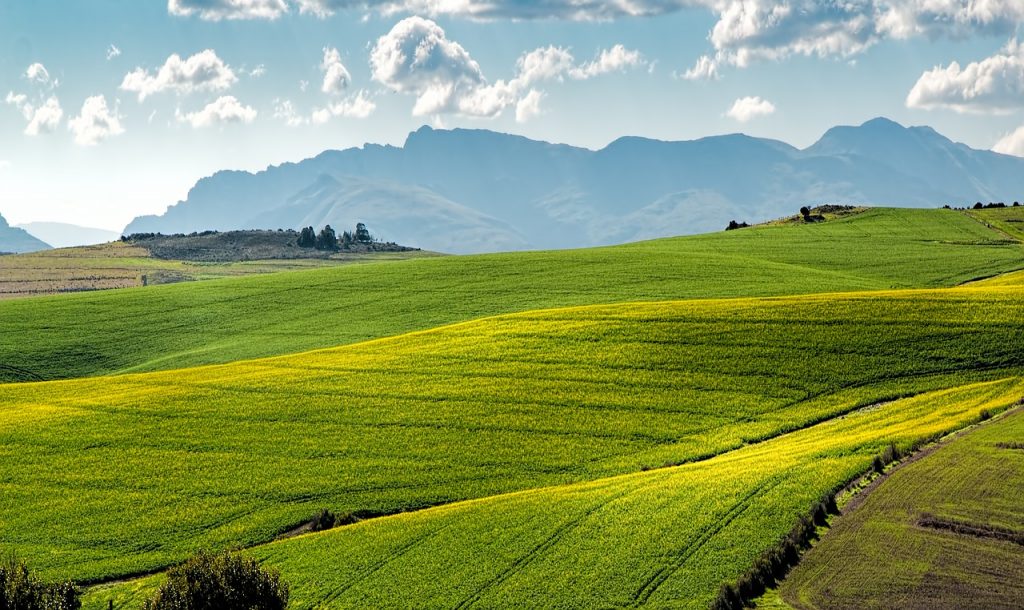Most of my life I have lived at the western edge of the Sonoran Desert. Inland southern California has neither enough good topsoil or enough water to have sustainable harvests without assistance. We import food or someone else’s water to build up our topsoil. Living in Pennsylvania this year has helped me to think about the different ecosystems of my life.
As a more regular inhabitant of PA, I have come to recognize that God’s good creation (above sea level) and all of God’s very good humanity are dependent on two things: six inches of healthy topsoil and the presence of rain. Without those two ingredients, nothing God has made for the land survives.

In the church, we need a healthy ecosystem too. It is built on the spiritual topsoil of historic longevity, the complex relationships of closely-knit families, and many people of different cultures. Spiritual topsoil also requires distribution into wild areas, cultivated spaces, and lived-in realities. But we also need rain. The atmosphere needs to be stirred and water vapor needs to be condensed into drops that fall on our organized topsoil, creating watersheds of life and hope together. In short, we need a vision shaped by two ingredients that engage in a constant and complex relationship of restoring life together.
So how do I pray these days for the congregation I am currently serving and the churches I continue to be privileged to serve as a Leadership Minister?
- First, I am learning in new ways to pray with an end in mind. That is, I pray for a good harvest (Matthew 9:37). I pray that our churches would conspire together to labor that all may come to know Jesus Christ as our ever-present Savior, teacher, friend, and Lord.
- For that harvest to happen, I also pray for good soil (Matthew 13:8). In our “good soil” I pray that the interplay of our traditions, experiences, and the ever-present, ever-compassionate Holy Spirit will make the Word of God a living thing in our lives that bears good and abundant fruit.
- Third, I pray for rain (Hebrews 6:7). I pray that the atmospheric conditions of turbulence in my congregation and in Mosaic Conference are stirred up by the Holy Spirit and the Word of God in such a way that the water vapor condenses, and fresh water falls into our common life. We who were once parched find ourselves quenched.

It is my observation that I have spent too much time, energy, and treasure on worrying about things that are not the main thing. I choose to pray for a return to collaborating on a great harvest, made possible by healthy, fertile topsoil, and refreshed from the turbulent atmosphere giving us the water we need for life together.
I realize that the church I currently serve and the Conference I have been serving have all the ingredients needed to fulfill God’s first great commission: to be stewards of all He has made. As we hold a vision for a great harvest, tend to the precious and thin layer of topsoil, and welcome the turbulent rain that makes us whole and alive, we fulfill our great purpose as the people of God.

As we hold a vision for a great harvest, tend to the precious and thin layer of topsoil, and welcome the turbulent rain that makes us whole and alive, we fulfill our great purpose as the people of God.
In this season of reimagining the church in the post-pandemic realities of our time, may we seek a great harvest, not shriveled relationships. May we tend to the precious resources God has given us together, and not walk away from one another. May we welcome the turbulent rains – soft showers and strong storms – that keep our souls thriving.
The opinions expressed in articles posted on Mosaic’s website are those of the author and may not reflect the official policy of Mosaic Conference. Mosaic is a large conference, crossing ethnicities, geographies, generations, theologies, and politics. Each person can only speak for themselves; no one can represent “the conference.” May God give us the grace to hear what the Spirit is speaking to us through people with whom we disagree and the humility and courage to love one another even when those disagreements can’t be bridged.
